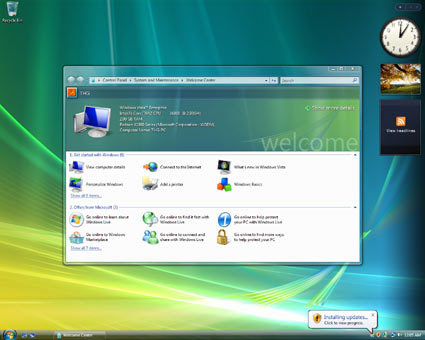Countdown to Windows Vista: The THG Rundown
Get Tom's Hardware's best news and in-depth reviews, straight to your inbox.
You are now subscribed
Your newsletter sign-up was successful
Do You Really Need Windows Vista Today?
While the official launch date for Windows Vista is January 30, 2007, it has been available to enterprise customers since December. According to Microsoft chairman Bill Gates, Vista is the most significant Windows launch ever. This is certainly true from a targeting standpoint, as it will be available in two versions for your home, a starter edition, a business version and an enterprise edition. All of them vary in features, but carry lots of nice and somewhat even overdue improvements - if you want it all, you will have to go for the Vista Ultimate flagship version. In this article, we dig into Vista's main features, and answer the key question: does it make sense to dive into the Vista groove right away?
In the early days of Windows 3.1 (1992-93), Microsoft added a professional version called Windows NT (New Technology). This new OS was available for various platform architectures - Intel, MIPS, Alpha and PowerPC - and was positioned to compete with UNIX-based solutions in the workstation space. While the 16-bit Windows 3.1 was ported to 32-bit with Windows 95 and Windows 98, Microsoft realized that it needed the more robust 32-bit Windows NT to move ahead. Not only did NT offer real 32-bit addressing, but it also integrated graphics functionality into the system kernel, which made a lot of sense for a graphical user interface (GUI) operating system. Windows NT 5 was called Windows 2000, Windows XP is version 5.1 and the brand-new Windows Vista is version 6 of Windows NT.
Vista comes more than five years after the release of Windows XP, making XP the Microsoft operating system with the longest life span ever. Windows Vista is intended to be the more secure Windows, as former versions constantly suffer from susceptibility to so-called malware, viruses or other forms of attack. Microsoft added several layers of security to Vista, such as an improved, built-in security center and firewall, and a utility to fend off unwanted software.
Yet we believe that the main advantages of Windows Vista are its highly improved accessibility and ease of use - we found Vista to be a very good companion for everyday work during our testing. Most of you are probably advanced Windows users, and I guess you know how to do what you want to do with Windows. But newbies, people with experience on other operating systems, and particularly older people, will have a much easier time connecting to a wireless network, installing a printer or sharing files with other people using Windows Vista.
What about performance? We will compare Windows Vista to Windows XP in another article, but there are two things you need to know right away: the Vista experience does not come for free, because all of the additions require a great deal of resources. There are some features to improve system responsiveness and to create a balanced performance experience, but we don't expect applications to execute any faster, whether you're using the 32-bit or the 64-bit version of Vista. Some applications could even run slightly slower, but considering the hardware requirements, we tend to believe that enthusiasts won't switch to Vista unless they have 2 GB of memory, a suitable graphics solutions and a modern dual core processor. In such a case, performance differences between Vista and XP will become negligible.
Join our discussion on this topic
Get Tom's Hardware's best news and in-depth reviews, straight to your inbox.
Current page: Do You Really Need Windows Vista Today?
Next Page Windows NT Version History
Patrick Schmid was the editor-in-chief for Tom's Hardware from 2005 to 2006. He wrote numerous articles on a wide range of hardware topics, including storage, CPUs, and system builds.
